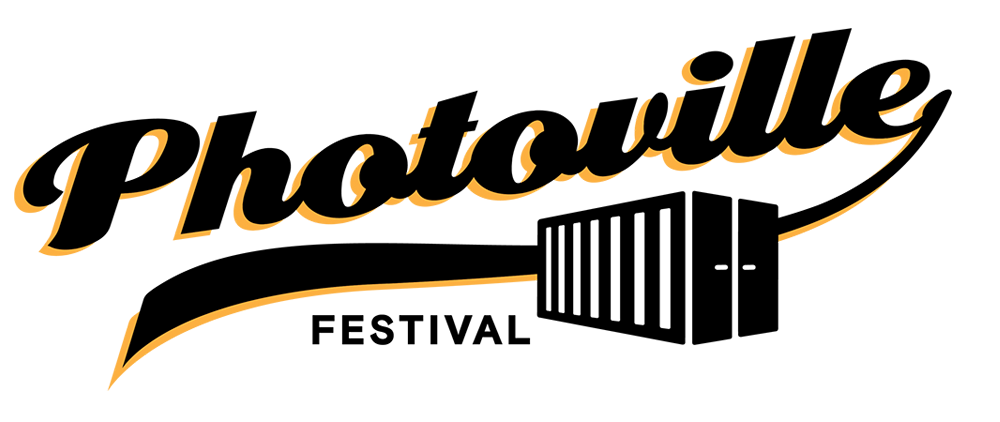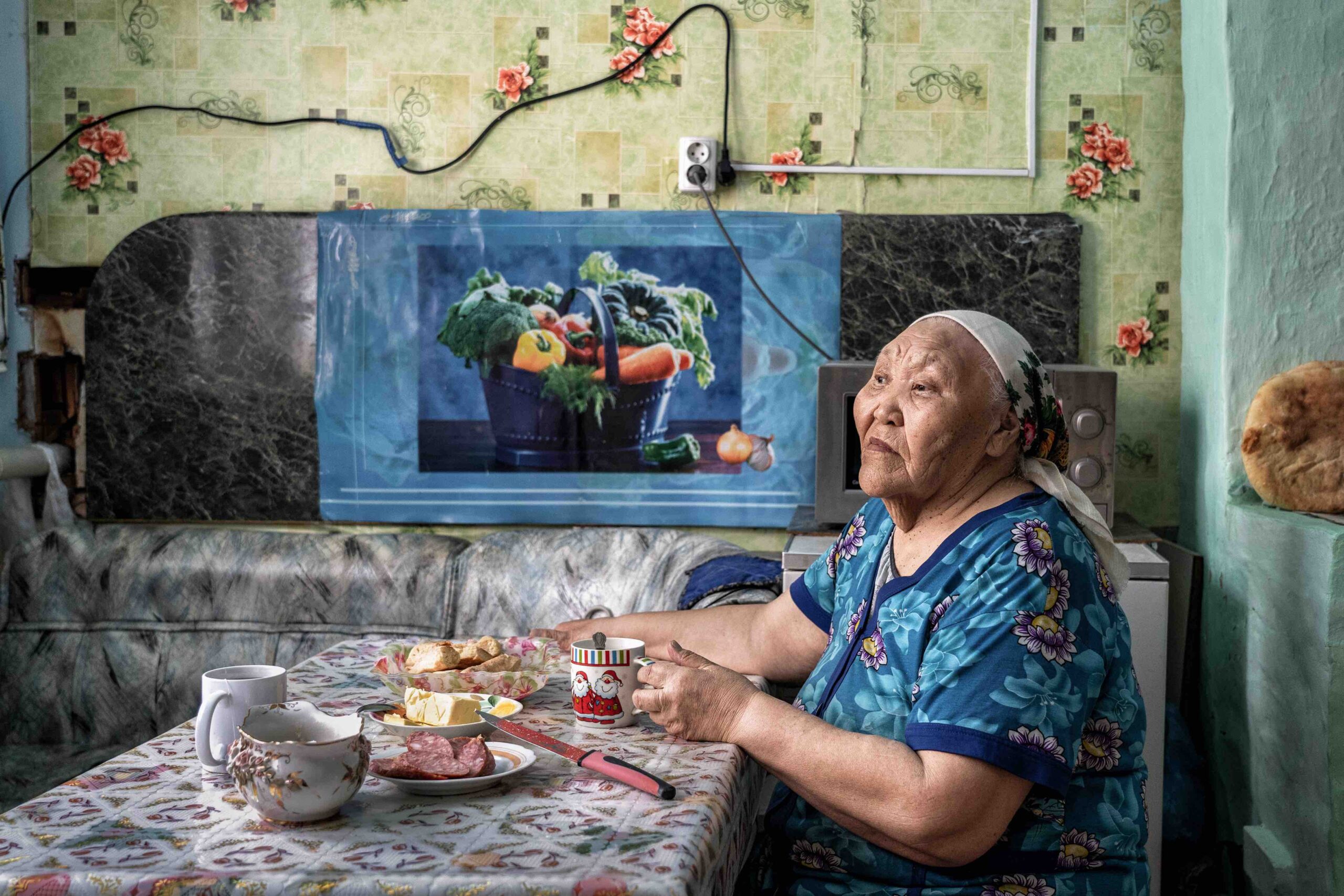

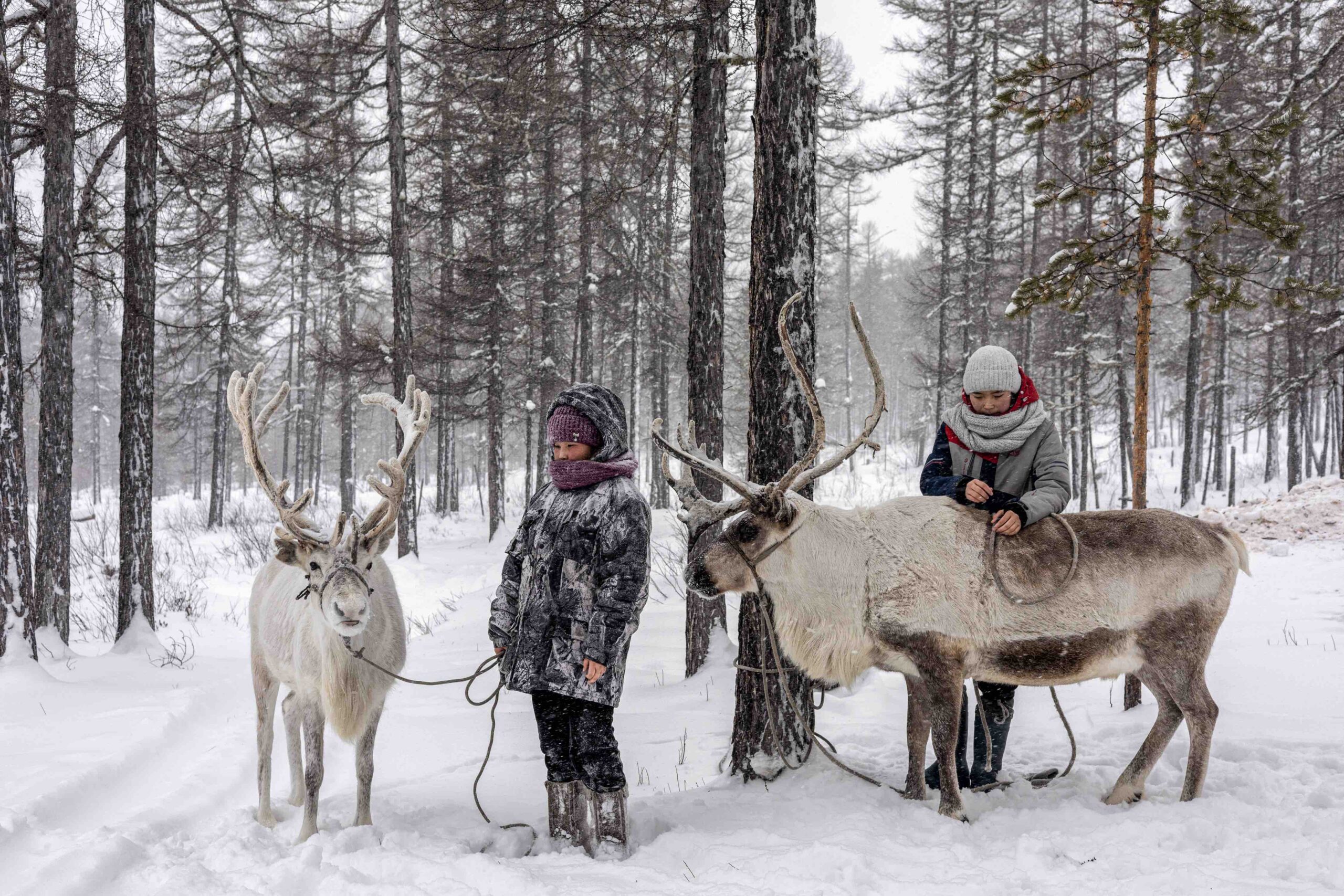
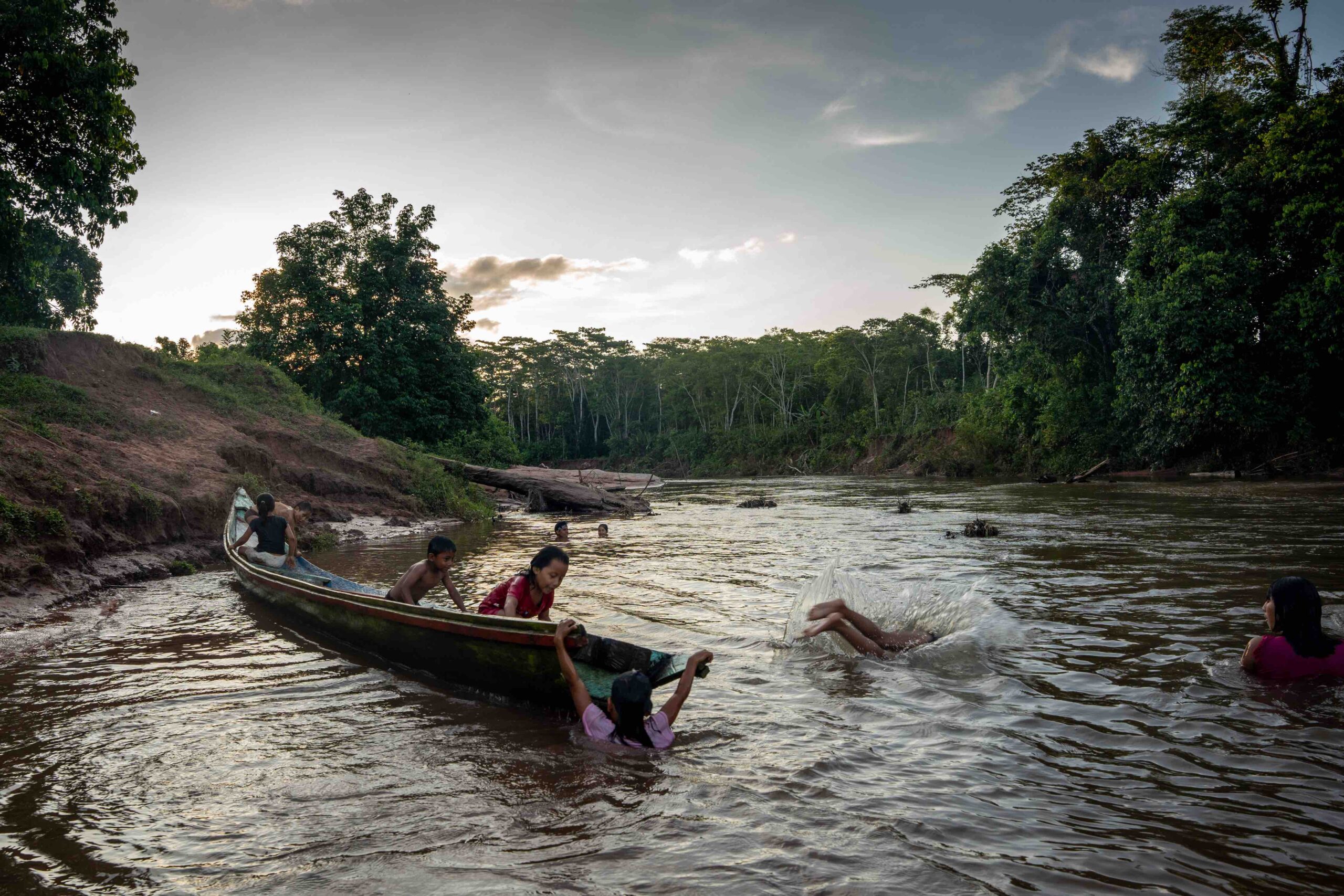
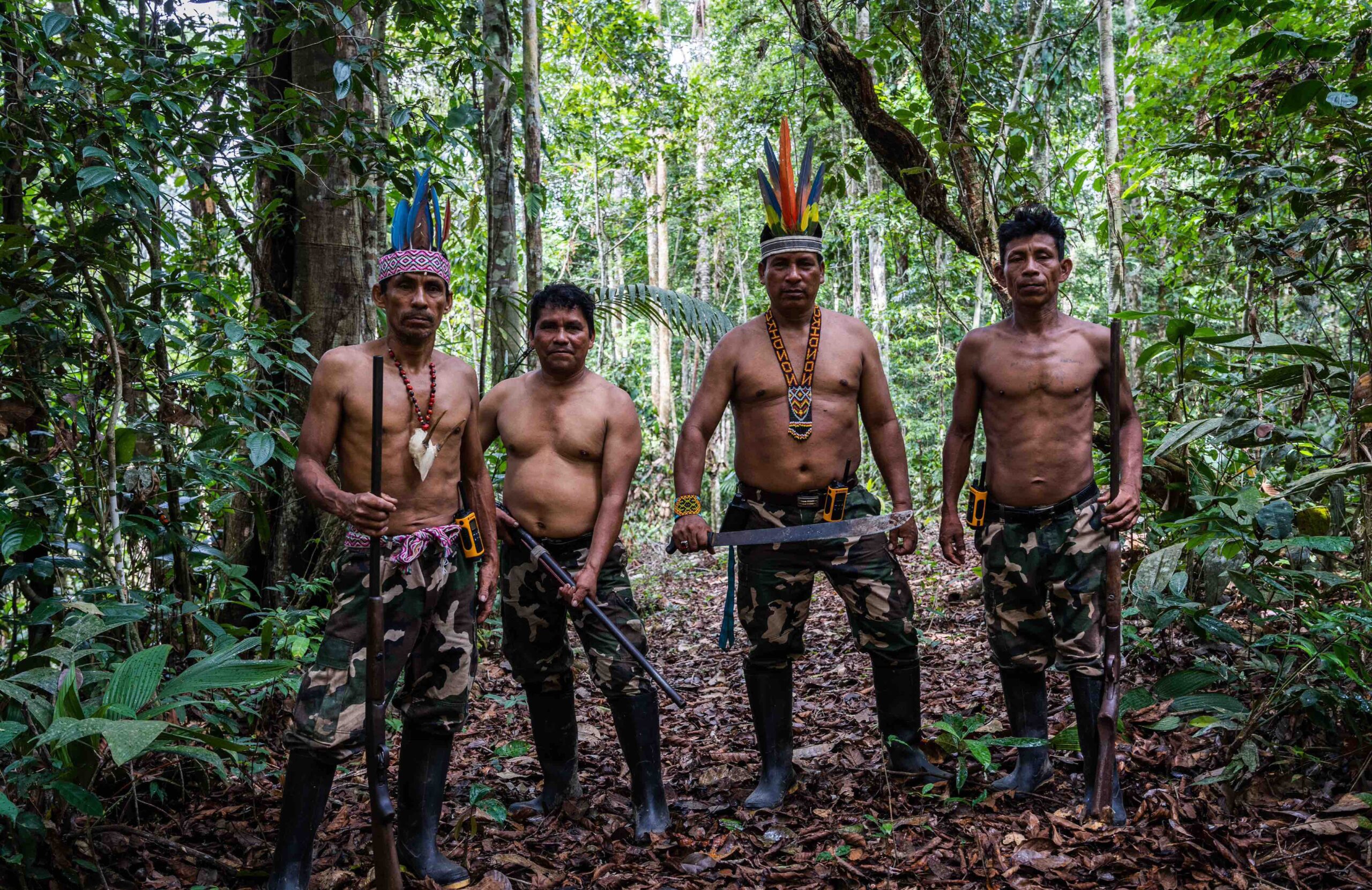
First-Place Winners: Natalya Saprunova, Sarah Fretwell
Honorable Mention Winners: Max Cabello Orcasitas, William Daniels, Maurizio Di Pietro, Isabella Franceschini
Rohingyatographer Collective: Sahat Zia Hero, David Palazón
ZEKE Award for Documentary Photography
Natalya Saprunova
The Evenki People: Custodians of the Resources of Yakutia
The north of Russia conceals countless riches such as gold and diamonds, but also Indigenous cultures, including the Evenki in Yakutia. Today, the taiga is massively felled — river beds are ravaged and groundwater is polluted — threatening entire ecosystems. The permafrost covering Siberian soil is melting due to climate change, releasing large quantities of greenhouse gasses. Today, the Evenki hope to bring their culture to life and inspire a younger generation to carry out traditional activities linked to reindeer herding, hunting, gathering, and crafts.
ZEKE Award for Systemic Change
Sarah Fretwell
Guardian of the Forest
Apu Quinto Inuma was a lumber trafficker turned park ranger turned rogue Forest Guardian, and became a tireless advocate for the environment and Native rights in the Amazon of Peru. To prevent the devastation of land by logging and drugs, Quinto organized Natives to patrol the forest. They worked to protect their children’s future and “their brothers who could not speak” — the trees of the forest. With old guns, machetes, and rubber boots, they risk their lives to monitor the buffer regions of Cordillera Azul National Park. On patrols, they look for new burn and grow areas and send the notes back to local officials. In November of 2023, Quinto was shot and killed in retaliation for his environmental work. His spirit still lives on in the forest.
ABOUT THE ARTISTS
First-Place Winners
Natalya Saprunova, born in 1986 in Murmansk in the Arctic region of Russia, is a documentary photographer now based in Paris and a member of the Zeppelin Agency. During her graduate studies as a French teacher in Russia, she worked as a photojournalist for the Murmansk Messenger daily newspaper. After arriving in France in 2008, she studied and worked in marketing for eight years in Paris. At the end of 2016, she gave up her permanent contract to return to photography, a field that has fascinated her since her early childhood. Now a naturalized French citizen and a 2020 graduate in Documentary Photojournalism from the EMI-CFD School in Paris, she continues to explore the issues of modern society related to identity, integration, climate change, youth, femininity, and spirituality. Passionate about the transmission of knowledge, she has been teaching photography at the Graine de Photographe school in Paris since 2016.
Sarah Fretwell, political scientist, director, and photographer, looks deeper into the intersection of the environment, people, and business with one question: “What if the new bottom line was love?” Her award-winning work explores the lives of everyday people with extraordinary stories. Her storytelling creates the human connection needed for understanding, international engagement, and solutions for change. Clients, publications, and exhibits include The World Bank Group, United Nations, USAID, USAID Indonesia, Tara Expeditions Foundation, BioCarbon Fund, SXSW Interactive, TEDx, The Royal Academy of Engineering, The Africa Prize for Engineering Innovation, Human Rights Watch, CNBC, Bloomberg, Business Insider, Social Documentary Network (SDN), Blue Earth Alliance, and Photoville. Sarah is a graduate of VII Masterclass, Arles 2022 – 2023. She is a current documentary storyteller with The Center: Visual Storytelling and Documentary Photography Projects.
Honorable Mention Winners
Max Cabello Orcasitas (b. Lima, 1974) has been working since December 2009 on a project about the consequences of Peru’s civil war (1980-2000) in Chungui and other sites in Ayacucho, an Andean region that was fiercely struck by political violence.
At the same time, he has been developing a series exploring how people celebrate on the outskirts of Lima and other Peruvian cities, demonstrating how modernity and tradition mingle in urban settings and among an emergent middle class mostly comprised by people who migrated from the Andes and the Amazon.
He is a founding member of the Supayfotos, a group of documentary photographers based in Lima. Since 2006, Cabello has received numerous prizes and recognitions, and has collaborated extensively with local and international artists.
William Daniels is a French photographer working on long-term documentary projects, with a particular interest for people’s quest for a sense of identity in territories prone to chronic instability.
In 2007, he won the Lagardère Foundation’s Young Photographer grant to conduct a personal project in the young and fragile Republic of Kyrgyzstan. The latter was prone to inter-ethnic clashes just a few years after the Tulips Revolution which had been hailed – and perhaps fantasized – by the West as the sudden ascent to democracy of a people liberated from the shackles of Soviet rule. This project was exhibited at the Fait Et Cause gallery in Paris, and self-published in the book, Faded Tulips (2012).
Since 2013, Daniels has traveled 10 times to the Central African Republic, a former French colony mired in extreme violence and mistrust between communities. His work was exhibited as a 100-meter-long fresco along the Seine in Paris in 2014; in a similar street show in New York in 2016; And at the War Photo Museum in Dubrovnik in 2015. In 2017, he published the book RCA (Clémentine de la Féronnière ed.)
Since 2015, William Daniels has also been making regular trips to the Russian Far. He has followed the Baikal-Amur mainline, documenting life along this mythical railway that has been abandoned since the fall of the USSR.
In 2019, the Pavillon Carré de Baudouin in Paris hosted his exhibition “Wilting Point”. The installation, conceived as an immersive experience, offered a transversal narration through images of conflict-ridden places (in the Indian Kashmir, the Central African Republic, Kyrgyzstan, the Bangladesh-Myanmar border…). Though the roots of these conflicts differ, they have one common denominator: a colonial past.
Aside from his personal projects, William Daniels contributes to National Geographic magazine, the National Geographic Society, Le Monde, and other international media. His assignments have won several international accolades, including two World Press Photo awards, a Visa d’Or at the Perpignan Photojournalism Festival, and the Tim Hetherington grant.
Maurizio Di Pietro is an Italian freelance photographer focusing on social and environmental issues. After graduating in Computer Science in 2001, Maurizio obtained a master’s degree in photography at WSP Photography School in Rome. It was at this point during his studies that he trained as a photographer and went on to work for several years as a stage photographer. He has collaborated with various NGOs in Morocco, Sri Lanka, Guatemala, and the West Bank, and later worked for several years in Kenya on the topic of climate change. His works have been published globally in magazines like National Geographic, Geo France, Der Spiegel, I’Espresso, and many others.
Isabella Franceschini is an Italian freelance photographer, Lowepro Ambassador, and member of the Parallelozera Agency. She holds a degree in Economics from the University of Bologna. In 2013, she began her photographic career through international workshops and, since then, photography has become a fundamental part of her life. She further honed her skills in photojournalism by attending a one-year masterclass in Rome. Isabella is currently developing long-term projects primarily inspired by what influences human beings and their relationships. In recent years, her projects have been published in magazines such as The Washington Post, Der Spiegel, l’Espresso, la Repubblica, Marie-Claire, Vanity Fair, and Getty Images. Her work has won numerous international awards. Her long-term project “Becoming a Citizen” won the 2022 “World Report Award Documenting Humanity” and was later exhibited at the Ethical Photography Festival in Lodi which in 2023 won the 21st Julia Margaret Cameron Award.
Rohingyatographer Collective
Sahat Zia Hero, born in 1994 in Maungdaw, Myanmar, is a photographer, writer, and human rights activist. Sahat initially aimed to study Physics at Sittwe University, but witnessing the systemic discrimination against the Rohingya community altered his path. Now living in a refugee camp in Bangladesh, Sahat has established himself as an advocate for his community.
Sahat’s photographic work has been exhibited at the Oxford Human Rights Festival and the Head On Photo Festival in Sydney. His written and photographic contributions have appeared in media such as Aljazeera, The Guardian, and NBC, as well as in academic journals of the Center for Migration Studies in New York and the Forced Migration Review by the Center for Refugee Studies of the University of Oxford.
In 2021, Sahat was nominated for the UNICEF Photographer of the Year Award, and in 2023 he received the Prince Claus Seeds Award and the Nansen Refugee Award.
David Palazón, born in Barcelona in 1972, is a designer, curator, and creative producer. He studied at the London College of Communication, the Royal College of Art, and the EICTV in Cuba. His work focuses notably on countries such as Bangladesh, Timor-Leste, Sri Lanka, Vanuatu, Palestine, and, more recently, Pakistan. Specializing in design, photography, documentary film, and visual anthropology, David has worked in partnership with several UN agencies, including IOM, UNHCR, UNICEF, and UNFPA, using art as a catalyst for social justice and change.
In Bangladesh, David was the curator implementing the Rohingya Cultural Memory Center in collaboration with IOM, the UN Migration agency. This experience forged valuable ties with Rohingya artists and photographers, catalyzing his subsequent role in the production of the Rohingyatographer magazine led by refugees together with Sahat.
Organizations
-
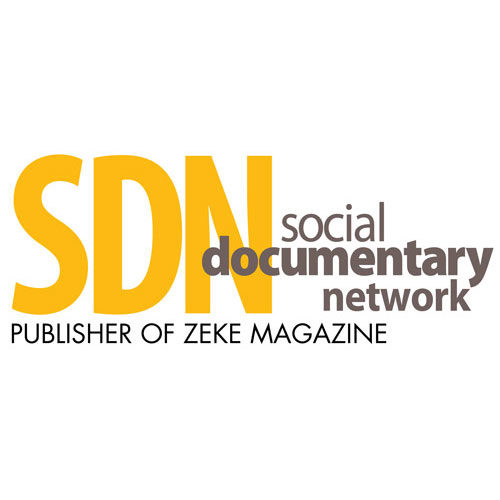
Social Documentary Network (SDN)
The Social Documentary Network (SDN), founded in 2008, is a global community of documentary photographers, editors, curators, NGOs, journalists, and others, who believe in the power of visual storytelling to build understanding and appreciation for the complexities, diversity nuances, wonders, and contradictions that abound in the world today.
Since our founding, the SDN website has featured more than 4,000 exhibits by nearly 3,000 photographers from all corners of the globe.
Our flagship publication, ZEKE: The Magazine of Global Documentary, is printed twice a year in print and year-round in digital, and features the most successful projects from the SDN website.
We also create gallery exhibitions, educational programs, lecture series, award programs, and portfolio reviews.
Recent stories on SDN and in ZEKE have explored sustainable solutions to the climate crisis, the war in Gaza, migration from Central America to the U.S., the war in Ukraine, the COVID-19 pandemic, the rising seas of Antarctica, life in Iran, asylum in America, teen mothers, and many other global themes.
2024 ZEKE Awards Winners
Featuring: Various Artists
Curated by: Glenn Ruga
Locations
ON VIEW AT: PhotoCube 47
View Location Details Download a detailed map of this location Brooklyn Bridge Park – Emily Warren Roebling Plaza1 Water St
Brooklyn, NY 11201
This location is part of Brooklyn Bridge Park
Explore other locations and exhibitions nearby
Partners: Foundation for Systemic Change and Digital Silver Imaging
